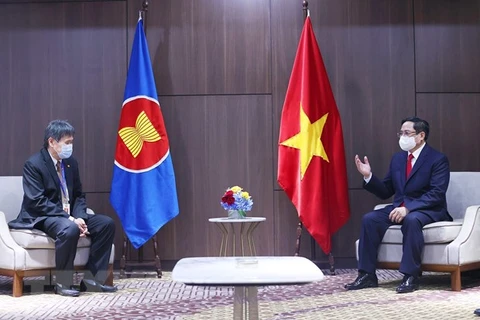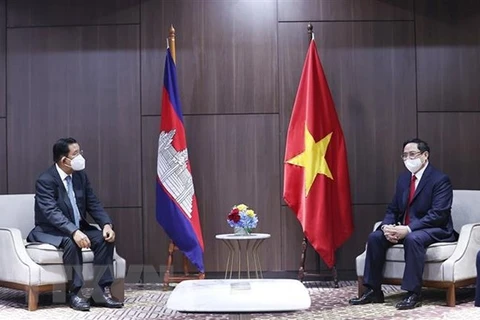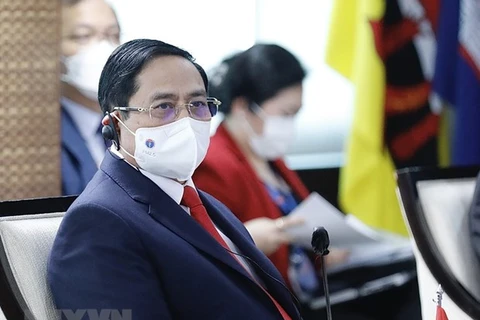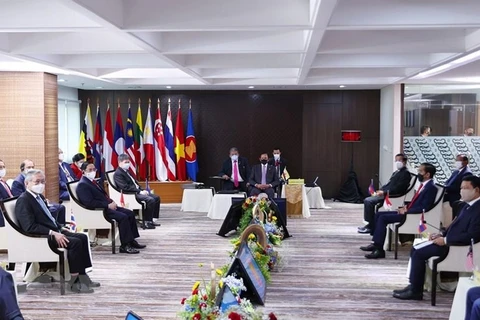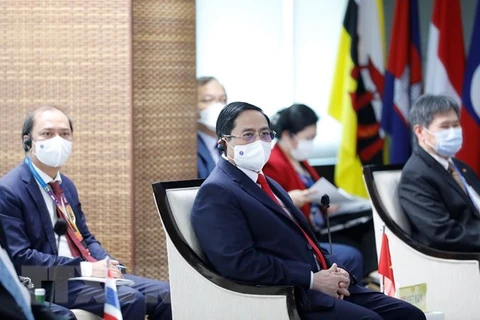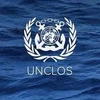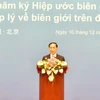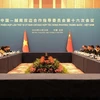Hanoi (VNA) – Prime Minister Pham Minh Chinh’s participation in the ASEAN Leaders’ Meeting in Jakarta, Indonesia, on April 23 and 24, his first overseas trip as the Government leader of Vietnam, has reflected the country’s great endeavour to contribute to the bloc’s common efforts in resolving many emerging issues.
This meeting was the first in-person event among ASEAN leaders in 2021 and after nearly 18 months ASEAN meetings had to take place via videoconference due to the COVID-19 pandemic.
In an interview with the media after the trip, Deputy Minister of Foreign Affairs Nguyen Quoc Dung said the meeting was held amid new and very complex COVID-19 outbreaks in many regional countries. However, regional leaders were still determined to meet face-to-face, showing the member states’ commitment and enormous efforts to overcome difficulties and deal with urgent issues emerging.
The Vietnamese PM attended the meeting less than 20 days after he took office, which demonstrated the country’s proactiveness, activeness, and responsibility for regional issues.
With its stature in ASEAN, especially after serving as Chair of the grouping in 2020 and now the only ASEAN member in the United Nations Security Council and the Council President for April, Vietnam’s participation and contributions were highly expected by the international and regional community, and the Vietnamese delegation led by PM Chinh has met that expectation.
Dung elaborated that the PM’s opinions and proposals received support from other ASEAN leaders as they matched the bloc’s current concerns and priorities, especially COVID-19 control, recovery promotion, and ways to effectively respond to new matters.
The PM took the occasion to promote the outcomes achieved during the 2020 ASEAN Chairmanship, and integrate the issues Vietnam has interests in like the East Sea and the Mekong River ones into ASEAN’s cooperation orientations.
He asked ASEAN to pay attention to narrowing the development gap in sub-regions, including the Mekong sub-region, and ensuring that no regions or areas are left behind, particularly when COVID-19 impacts are widening the development gap in ASEAN, Dung noted.
The Vietnamese leader held that the trust and goodwill of relevant sides should be reflected via actions in reality and the avoidance of any move that may escalate tensions or complicate the situation.
He emphasised that ASEAN should sustain its principled stance on the East Sea issue, including maintaining peace, stability, security, and safety of navigation and overflight; complying with international law, including the 1982 United Nations Convention on the Law of the Sea (UNCLOS); seriously implementing the Declaration on the Conduct of Parties in the East Sea (DOC); and soon finalising an efficient and effective Code of Conduct (COC) in the waters, according to Deputy Minister Dung.
Sharing other leaders’ viewpoints on international and regional issues of common concern, including the Myanmar situation, PM Chinh affirmed the respect for the principle of not intervening in other states’ internal affairs, but noted that with the spirit of solidarity of a community, ASEAN could not neglect the issues affecting the region’s common stability and development.
According to Deputy FM Dung, the Vietnamese PM’s proposals about ways ASEAN can assist Myanmar have many things in common with other ASEAN leaders’ opinions, which are sending the bloc’s representatives to this country to learn about the situation and meet related parties to promote dialogue and seek solutions, while augmenting humanitarian aid for people.
Talking about efforts by Vietnam, as a non-permanent member of the UN Security Council and President of the council for April, in maintaining balanced dialogue about Myanmar at the council, the PM recommended ASEAN countries and Myanmar coordinate closely together to join Vietnam in calling for partners to support the bloc’s role in seeking suitable, feasible, fundamental, and substantive solutions to the Myanmar issue, Dung went on.
On the sidelines of the meeting, PM Chinh had a series of bilateral meetings with other ASEAN leaders, including Indonesian President Joko Widodo (host of the ASEAN Leaders’ Meeting), Bruneian Sultan Haji Hassanal Bolkiah (Chair of AEAN in 2021), Cambodian PM Hun Sen, Singaporean PM Lee Hsien Loong, and Malaysian PM Muhyiddin Yassin.
He also met with heads of other countries’ delegations like Laos, Thailand, the Philippines, and Myanmar who congratulated Chinh on his new post and expressed their hope for his attention to enhancing bilateral ties.
Via PM Chinh’s first high-level diplomatic meetings with important partners in ASEAN, Vietnam reiterated the foreign policy issued at the 13th National Party Congress, which is attaching importance to developing the cooperation and traditional friendship with neighbouring and ASEAN countries, Dung said.
The leaders of Vietnam and other countries discussed many strategic issues with important visions and orientations for their relations. They also agreed to work closely and support each other at international forums, including in strengthening ASEAN’s centrality and reinforcing links between the bloc and the UN.
PM Chinh also reiterated Vietnam’s consistent stance on the East Sea issue, stressing the importance of adhering to international law, including the 1982 UNCLOS.
Deputy FM Dung concluded that the outcomes of the bilateral activities have created a solid foundation for implementing Vietnam’s foreign policy towards important partners right from the beginning of the new Government term, noting that they were also a positive start helping to set up the cooperative ties and friendship between PM Chinh and other ASEAN leaders./.
This meeting was the first in-person event among ASEAN leaders in 2021 and after nearly 18 months ASEAN meetings had to take place via videoconference due to the COVID-19 pandemic.
In an interview with the media after the trip, Deputy Minister of Foreign Affairs Nguyen Quoc Dung said the meeting was held amid new and very complex COVID-19 outbreaks in many regional countries. However, regional leaders were still determined to meet face-to-face, showing the member states’ commitment and enormous efforts to overcome difficulties and deal with urgent issues emerging.
The Vietnamese PM attended the meeting less than 20 days after he took office, which demonstrated the country’s proactiveness, activeness, and responsibility for regional issues.
With its stature in ASEAN, especially after serving as Chair of the grouping in 2020 and now the only ASEAN member in the United Nations Security Council and the Council President for April, Vietnam’s participation and contributions were highly expected by the international and regional community, and the Vietnamese delegation led by PM Chinh has met that expectation.
Dung elaborated that the PM’s opinions and proposals received support from other ASEAN leaders as they matched the bloc’s current concerns and priorities, especially COVID-19 control, recovery promotion, and ways to effectively respond to new matters.
The PM took the occasion to promote the outcomes achieved during the 2020 ASEAN Chairmanship, and integrate the issues Vietnam has interests in like the East Sea and the Mekong River ones into ASEAN’s cooperation orientations.
He asked ASEAN to pay attention to narrowing the development gap in sub-regions, including the Mekong sub-region, and ensuring that no regions or areas are left behind, particularly when COVID-19 impacts are widening the development gap in ASEAN, Dung noted.
The Vietnamese leader held that the trust and goodwill of relevant sides should be reflected via actions in reality and the avoidance of any move that may escalate tensions or complicate the situation.
He emphasised that ASEAN should sustain its principled stance on the East Sea issue, including maintaining peace, stability, security, and safety of navigation and overflight; complying with international law, including the 1982 United Nations Convention on the Law of the Sea (UNCLOS); seriously implementing the Declaration on the Conduct of Parties in the East Sea (DOC); and soon finalising an efficient and effective Code of Conduct (COC) in the waters, according to Deputy Minister Dung.
Sharing other leaders’ viewpoints on international and regional issues of common concern, including the Myanmar situation, PM Chinh affirmed the respect for the principle of not intervening in other states’ internal affairs, but noted that with the spirit of solidarity of a community, ASEAN could not neglect the issues affecting the region’s common stability and development.
According to Deputy FM Dung, the Vietnamese PM’s proposals about ways ASEAN can assist Myanmar have many things in common with other ASEAN leaders’ opinions, which are sending the bloc’s representatives to this country to learn about the situation and meet related parties to promote dialogue and seek solutions, while augmenting humanitarian aid for people.
Talking about efforts by Vietnam, as a non-permanent member of the UN Security Council and President of the council for April, in maintaining balanced dialogue about Myanmar at the council, the PM recommended ASEAN countries and Myanmar coordinate closely together to join Vietnam in calling for partners to support the bloc’s role in seeking suitable, feasible, fundamental, and substantive solutions to the Myanmar issue, Dung went on.
On the sidelines of the meeting, PM Chinh had a series of bilateral meetings with other ASEAN leaders, including Indonesian President Joko Widodo (host of the ASEAN Leaders’ Meeting), Bruneian Sultan Haji Hassanal Bolkiah (Chair of AEAN in 2021), Cambodian PM Hun Sen, Singaporean PM Lee Hsien Loong, and Malaysian PM Muhyiddin Yassin.
He also met with heads of other countries’ delegations like Laos, Thailand, the Philippines, and Myanmar who congratulated Chinh on his new post and expressed their hope for his attention to enhancing bilateral ties.
Via PM Chinh’s first high-level diplomatic meetings with important partners in ASEAN, Vietnam reiterated the foreign policy issued at the 13th National Party Congress, which is attaching importance to developing the cooperation and traditional friendship with neighbouring and ASEAN countries, Dung said.
The leaders of Vietnam and other countries discussed many strategic issues with important visions and orientations for their relations. They also agreed to work closely and support each other at international forums, including in strengthening ASEAN’s centrality and reinforcing links between the bloc and the UN.
PM Chinh also reiterated Vietnam’s consistent stance on the East Sea issue, stressing the importance of adhering to international law, including the 1982 UNCLOS.
Deputy FM Dung concluded that the outcomes of the bilateral activities have created a solid foundation for implementing Vietnam’s foreign policy towards important partners right from the beginning of the new Government term, noting that they were also a positive start helping to set up the cooperative ties and friendship between PM Chinh and other ASEAN leaders./.
VNA

